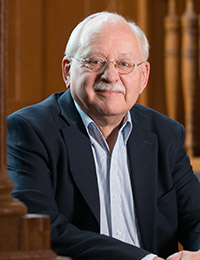
Gordon Scholz
Emeritus Professor & Director of the Community & Regional Planning ProgramBrief Vitae
A.I.C.P.
Master of Business Administration, University of Nebraska at Omaha
Master of Urban Planning, University of Illinois at Urbana/Champaign
Master of Architecture, University of Illinois at Urbana/Champaign
Bachelor of Architecture, University of Nebraska-Lincoln
At the time of Gordon Scholz’s retirement, he faithfully served the college and its alumni for over 46 years, starting as an assistant professor in 1974 at the time the College of Architecture was established. By 1989 he was full professor and chair of the Department of Community and Regional Planning; he later served as program director. He served in these administrative roles at three different times, totaling 29 years.
Scholz is a native Nebraskan, growing up in Bellevue. He earned his Bachelor of Architecture degree at UNL and graduate degrees in urban planning and architecture at the University of Illinois at Urbana-Champaign. He is a member of the American Institute of Certified Planners and is a licensed architect in the state of Nebraska.
Under his leadership, the Community and Regional Planning Program initiated dual degree programs to connect the Master of Community and Regional Planning (MCRP) degree with other UNL graduate degree programs including Architecture’s M.Arch., Law’s JD and Civil Engineering’s MS-CE degree; and coordinated eight consecutive successful accreditation and re-accreditation reviews for the MCRP Program.
Scholz’s contributions across the university demonstrate his commitment to academic excellence. His service has included membership on the UNL Faculty Senate, the Faculty Senate Executive Committee and the Center for Great Plains Studies Board of Governors, among 35 other UNL service positions throughout his employment.
At the national level, Scholz has served on the board of the Urban Design & Preservation Division of the American Planning Association, as well as a site visitor for the Planning Accreditation Board. He served twice as president of the Nebraska Chapter of the American Planning Association (APA) and was recipient of the Mitsuo Kawamoto Excellence in Planning Award from the Nebraska Chapter APA and the Wozniak-Selander Award for a Planning Pioneer from the Nebraska Planning and Zoning Association.
Scholz’s work during his tenure made a significant impact for Nebraska communities. In addition to his community service positions, such as board member of the Preservation Association of Lincoln and member of the City of Lincoln’s Urban Design Committee, he has led numerous studio/course-based collaborations with community organizations across Nebraska. In 2019, Scholz galvanized a program effort to help the village of Winslow, Nebraska, with their flood recovery efforts and explored the option of relocating their community to higher ground.
Additionally, Scholz has led multiple UNL graduate planning studio collaborations with NeighborWorks Lincoln, the Lincoln/Lancaster County Planning Department and the City of Lincoln Urban Development Department on various stages of community planning in Lincoln’s older neighborhoods. He has worked with faculty colleagues and student teams to help various areas in Nebraska with community planning, including projects in Blair, Columbus, Crete, Custer County, Fremont, Grand Island, Oakland, Stromsburg, Superior, Valentine, and Wahoo.
As an alumnus of UNL’s architecture class of 1968, Scholz was a natural liaison with his graduating class and helped garner one of the strongest, most impactful alumni cohorts the college enjoys today. The class of 1968 has regularly held reunions and collectively raised over $68,000 in periodic campaigns among its members to establish an endowed Class of 1968 Scholarship Fund in the University of Nebraska Foundation.
Areas of Interest
Professor Scholz's teaching responsibilities included Introduction to Planning, Planning and Design in the Built Environment, Historic Preservation, and Land Development: Actors and Factors in the Process.
Follow the College of Architecture